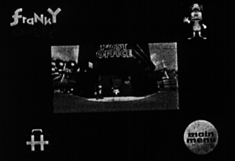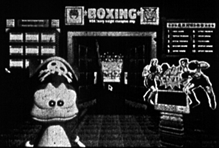[
homepage
|
subscriptions
|
feedback
|
guestbook
|
contents
]
Swashbuckling in Cyberspace
by Bob Johnstone
Tsuyoshi Takashiro is the coolest nerd in town--and he's making a bundle.

Five years ago, Tsuyoshi Takashiro was homeless. Most nights, he slept in his
car. Today, he claims he still doesn't need a home. "I want to be a digital
nomad," he says. "All I need is a small car and a cellular phone." But the
brand-new, bright-red Porsche convertible outside Takashiro's studio does not
look slept in. As the eccentric young dynamo behind Franky Online--Japan's
most ambitious foray into cyberspace--Takashiro can afford to stay wherever he
likes.
I first saw Takashiro in action last May, at an international conference on
multimedia held in Tokyo. It was a blue-chip, government-sponsored event
featuring big-name speakers like former French prime minister Edith Cresson.
Takashiro joined an afternoon panel session entitled, "Multimedia in the 21st
Century," in which his co-panelists included two university professors and a
63-year-old executive from a leading electronics firm. The old farts droned on
and on, fretting about the threats that multimedia posed to industry, the loss
of jobs and so on.
Finally, it was Takashiro's turn to speak. Up he popped, this bearded,
twinkle-eyed imp, clad in an oversize black pea-jacket and red cravat. Without
further ado, he booted his PC-driven projector and launched into his spiel.
"You want to know what multimedia is?" he asked the audience briskly.
"This is multimedia!" And he proceeded to demonstrate Franky Online,
on-stage and in realtime.
Franky Online is Takashiro's attempt to bust online services out of the hands
of the techno-nerds and make them accessible to ordinary people. In physical
terms, Franky is a CD-ROM that brings up a colorful Coney-Island-like cartoon
world on the screen of your personal computer. Sign up (via modem) for the
online services, and merely by pointing and clicking your way around, you can
visit virtual shops, like the Santa Claus Machine, where you can order items
like T-shirts and toys. Via Franky, you can also connect to the Internet and
the World Wide Web. All for just Y500 a month, including five hours of
free connect-time.
Takashiro told us that Franky would be launched with a massive mail-out of
CD-ROMs containing the connecting software for the online service. "And how
much do you think we'll charge for this?" he asked. Before we had time to
guess, he answered: "Nothing--it'll be free." Gasps of surprise went up.
I met Takashiro afterwards, and at that point, I was not entirely convinced
that he was for real. But about a month later, just as he had promised, my
free copy of the Franky Online CD-ROM arrived in the mail. That did it. Who
was this guy, anyway? I had to find out.
It was worth the trip to Takashiro's Harajuku headquarters just to see his
playroom. An attic which runs the length of the building, it is piled high
with pop art bric-a-brac of all descriptions: Godzilla posters, Beavis and
Butthead cut-outs, the Coneheads, Batman, plastic skulls with glowing eyes,
stuffed dolls, gnomes, stacks of books, videos, CDs and every other conceivable
form of media item, all topped off by a pair of bull's horns hanging on a
crossbeam. Not exactly your average CEO's office.
Then in bounced the man himself, fresh from Venice Beach, California (where
his company has a satellite office), wearing an outsize Roy Lichtenstein-print
Captain America T-shirt, baggies, sneakers and a Future Pirates (the name of
his company) cap.
Being interviewed is obviously something Takashiro enjoys. A natural
showman,
he delights in being outrageous. I wanted to know who his backers were, who
was putting up the cash for all his computers, for the huge amounts of data
storage--the two tera [that's "tera" as in "trillion"] bytes--that it takes to
run something like Franky, and of course, for the Porsche. "Too many people
want to give me money," he replied. "Every major bank, venture capitalists,
the chairman of Sega . . ."
"Takashiro's very smart. He knows what he wants, and he's successful at
getting it done," comments another young cyber-entrepreneur, Joi Itoh of the
start-up venture, Studio Garage. "He's been very shrewd in his dealings with
ad agencies and banks."
Having people lined up to lend you money is not a normal occurrence for a
young entrepreneur in risk-averse Japan. But these are strange days, when many
sense that business paradigms are shifting and that cyberspace is the place to
be. Takashiro's timing is impeccable: he is perfectly positioned to ride this
new wave, a future pirate swashbuckling his way through the waters of the
'Net.

Big corporations are falling over themselves to pay Future Pirates serious
money for the chance to sell their stuff through Franky. They include toymaker
Bandai, which wants to add its own cyber arcade, and audio-video specialist
JVC, which is working with Future Pirates on--what else?--a virtual karaoke bar
("just download and sing along"). Revenue also comes from
advertising--everybody from National Panasonic to Domino's Pizza is erecting
electronic billboards in Franky-land. Takashiro also has his own ambitions: "I
want to be Japan's first electronic publisher," he says, and he has formed a
new company, Soft M@chine, to come up with the digital content.
For all his business acumen, Takashiro's background is art school. Before
Franky, he produced an interactive CD-ROM game based on the U.S. cartoon
Wacky Races. Before that, he was a director. His credits include
commercials, TV dramas and music videos. His masterpiece--according to
him--was Banana Chips Love, a film which he wrote, scripted, designed,
produced and directed [see "The Conversation," May 1992 TJ]. It is the
tale of a Japanese girl who goes to New York and meets a pair of gay twins, and
features cameos by LSD guru Timothy Leary as a ghost, and beat poet Allen
Ginsberg, "as a sort of Dalai Lama."
I ask him who he most admires. "Bill Gates and Steven Spielberg," he says.
"I study American CEOs because they're younger and more creative. Japanese
CEOs are very square--old men wearing ties and dark jackets, over 60. I tell
them, `I am the new type, I have a creative mind, but you don't understand me
at all.'"
Ironically, it was Takashiro's admiration for Spielberg that led him away
from
movies and into multimedia. As the use of computers at his film production
company escalated, he became interested in the potential of online business.
He quickly realized that existing services were vulnerable in two respects.
"Japanese Internet providers are 10 times too expensive," he says. "And what
they provide looks cheap--there's no design, no entertainment--and that's no
good." Ergo Franky, with its colorful looks and ease of use.
Clearly, Takashiro has zoomed in on a niche; only months after its launch,
Franky had become so popular that Future Pirates had to freeze its subscription
list at 20,000 in order to give the phone company time to hook up an extra
hundred high-speed lines to handle the demand.
With Takashiro blazing a trail through Tokyo's cyberspace, a creative,
homegrown Internet industry seems finally at hand. And most of it is the
domain of a new generation--the average age of the crew manning Future Pirates
is just 22. "Crazy Tokyo kids," says Takashiro. "They're cheap--and they're
good."
[
homepage
|
subscriptions
|
feedback
|
guestbook
|
contents
]
Copyright © Tokyo Journal

